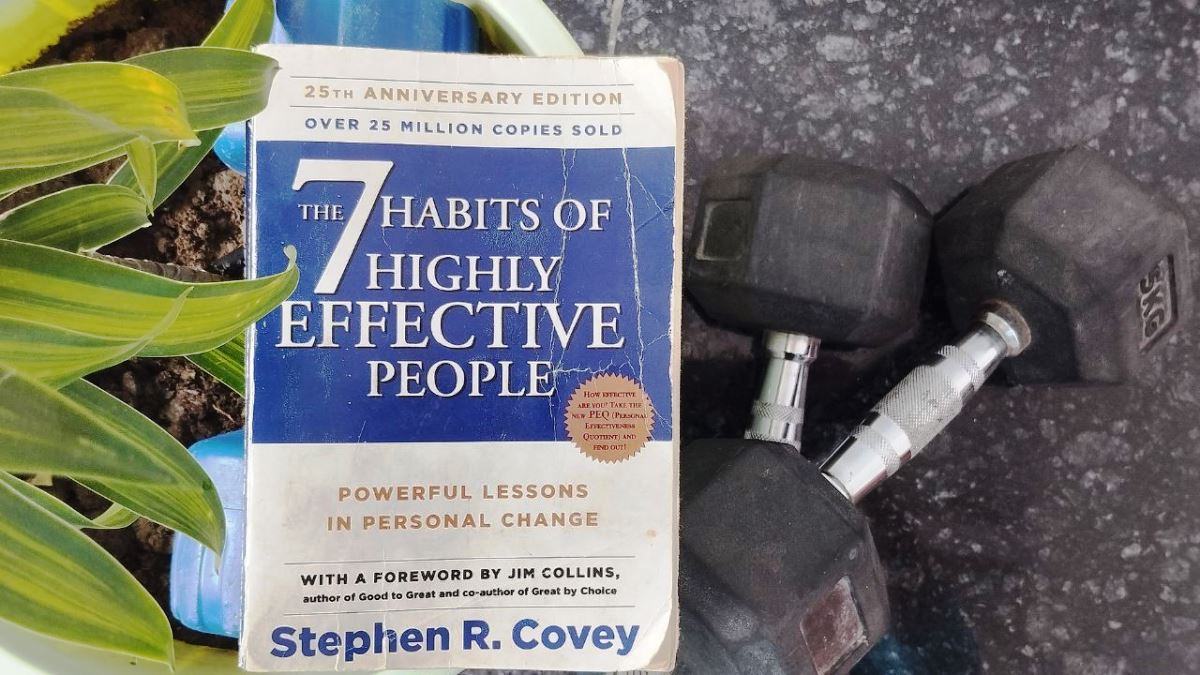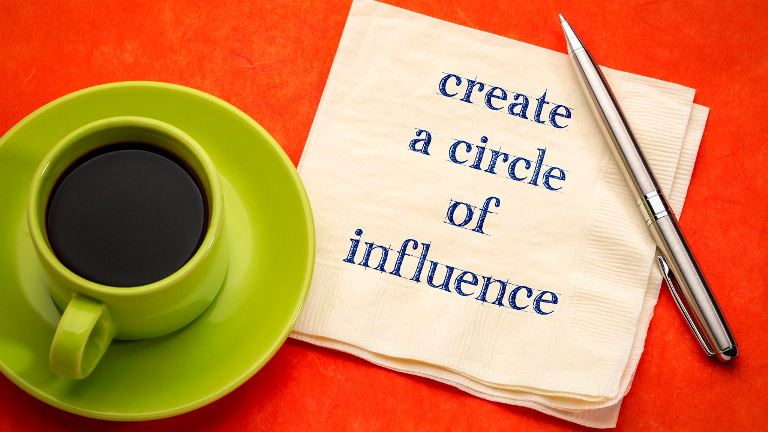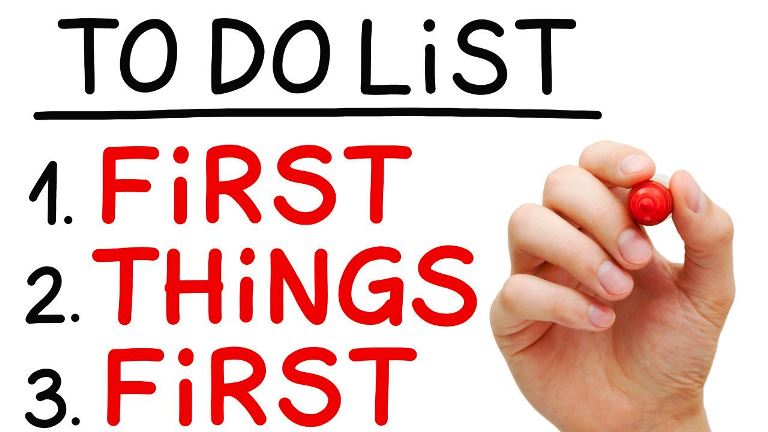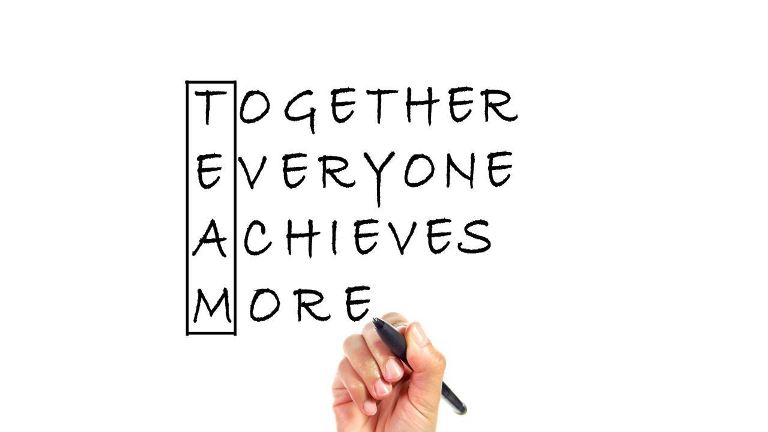This book was first published in 1989; over 35 years later, it is still famous among the youth.
Stephen R. Covey’s The 7 Habits of Highly Effective People was chosen as the most influential business book of the 20th century.
Its habits are transformative both for businessmen and for ordinary people.
The book is organized according to seven fundamental habits. The first three habits are meant to achieve independence, the second three interdependencies, and the seventh is intended to maintain the previous.
As you begin reading The 7 Habits of Highly Effective People, apply what you have learned. Remember, learning and not applying is really not learning.

- Part One: Paradigms And Principles
- Habits Defined
- Part Two: Private Victory
- Habit 1# Be Proactive
- Circle Of Concern And Circle Of Influence
- Habit 2# Begin With The End in Mind
- What does it mean to “Start With The End In Mind”?
- Habit 3# Put First Thing First
- Part Three : Public Victory
- Paradigms of Interdependence
- Emotional Bank Account
- Habit 4# Think Win /Win
- Six Paradigms of Human Interaction
- Habit 5# Seek First to Understand, Then To be Understood
- Habit 6# Synergize
- Habit 7# Sharpen The Saw
- Four Dimensions of Renewal
Part One: Paradigms And Principles
The 7 Habits Of Highly Effective People represent many of the fundamental principles of human effectiveness.
These habits are basic and primary. They’re how we learn the things that make us happy and successful.
But, before we truly understand these seven Habits, we must understand our own “paradigms” and how to make a “paradigm shift.”
A paradigm is a way of “seeing” the world. We see the world not as it is but as we are conditioned to see it.
Both the character Ethic and the Personality Ethic are examples of social paradigms.
Focus on your attitudes and behaviors to make relatively minor changes in your life. To make significant quantum changes, work on your basic paradigms.
Thomas Kuhn introduced the term paradigm shift in his highly influential book, The Structure of Scientific Revolutions.
Mr. Covey shared an instance of Paradigm Shift: one morning, he was sitting on the subway in New York. People were sitting quietly, some reading newspapers, and some resting.
Then suddenly, a man came with his children and entered the Subway. The children were very loud and excited, and the environment changed instantly.
The man sat beside me and closed his eyes, oblivious to the situation. They were throwing things and even grabbing people’s papers. It was very disturbing; like me, other people were also irritated.
I felt unusually patient and restated, so finally, I asked him, “Can’t you control your children?”
Then, the man replied softly, ”O, you’re right.” I guess I have to do something. We just came to the hospital where their mother died about an hour ago.
I don’t know what to think and how to handle it.
Suddenly, my perspective changed, and I perceived and acted differently. As a result, my irritation vanished. Now, my heart was filled with sympathy and compassion.
Habits Defined
Stephen defines a habit as the intersection of knowledge, skill, and desire for our purpose.
- Knowledge is a theoretical paradigm—the What to do.
- The skill is how to do it.
- Desire is the motivation, the want to do.
We have to do all three things to make something a habit.
READ It To Find True Happiness And Purpose of Life: Ikigai Book Summary (With Pdf)
Part Two: Private Victory
The key is not to prioritize what’s on your schedule, but to schedule your priorities.
Stephen Covey
Habit 1# Be Proactive
I know of no more encouraging fact than the unquestionable ability of man to elevate his life by conscious endeavor.
Henry David Thoreau
Look at the word responsibility- “response-ability”–the ability to choose your response.
Highly productive people recognize their responsibility. They don’t blame circumstances, conditions, or conditioning for their actions.
Their behavior results from their conscious choice and is based on values.
Proactive people focus on their efforts on things they can change, whereas reactive people focus on areas of their lives in which they have no control.
Attitude and behavior flow out of our paradigms. If you are self-aware, you can examine them in your own (words) language.
There are two types of language: proactive and reactive. That language comes from a basic paradigm.
Reactive people don’t take responsibility for their actions. They are reinforced with the paradigm that they are determined and become a self-fulfilling prophecy.
They always blame outside forces, other people, circumstances, and even the stars for their situation. Instead, proactive people make love a verb.
Another excellent way to become more self-aware of our degree of proactivity is to examine where we focus our time and energy.
Learn the 80/20 Principle and How to Use It to Become Happy and Blessed.
Circle Of Concern And Circle Of Influence
- Proactive people work on the things they can do something, and by nature, are positive, enlarging, and magnifying. That is the reason positive energy increases the Circle of Influence.
- Reactive people, on the other hand, focus their efforts on other people’s weaknesses, environmental problems, and the circumstances over which they have no control. They focus only on blaming and accusing attitudes, reactive language, and increasing the feeling of victimization. They reduce their Circle of Influence due to the negative energy generated by the focus on negativity.

Habit 2# Begin With The End in Mind
What lies behind us and before us are tiny matters compared to what lies within us.
Oliver Wendell Holmes
Stephen begins this chapter by thinking about your funeral.
He wants you to think about how your loved ones will remember you, what you accomplished, and how you helped them.
Four types of speakers come to your funeral.
- First, Your immediate family-children, brother, sister, spouse, parents, grandparents.
- Second, your friends
- Third, people belong to your work and profession.
- Fourth, from your church or some community organization.
Now, think deeply about what you would like each of these speakers to say about you and your life. What kind of friend, son, husband, and working associate would you be to them?
Take a moment and write it down; it will significantly enhance your personal understanding of Habit 2.
Want To Know How To Get Blessed With Money And Happiness? Read This. The Richest Man In Babylon Book Summary
What does it mean to “Start With The End In Mind”?
It means clearly understanding your destination and knowing where you are going. It is the right direction.
“Begin with the end in the mind” is based on the principle that all things are created twice.
There’s a mental or first creation and a physical or second creation to all things.
For example, when you want to build a new house.
First, you draw on paper a place for other family members, such as your kids’ room, parents’ room, living area, or your bedroom. Then, you start construction.
Like the carpenter’s rule, “measure twice, cut once.”
Another example is If you want to raise responsible, self-disciplined children, you should keep that end in mind with your children daily. You cannot treat them in a way that undermines their self-respect and self-esteem.
Habit 1 says,” You are the creator,” and Habit 2 is the first creation.
Habit 2 is based on the idea that leaders are created by themselves.
Management is not leadership; leadership is the second creation, which we’ll discuss in Chapter 3.
Habit 3# Put First Thing First
“Things which matter most must never be at the mercy of things which matter least.
Goethe
Covey asks you to answer the following questions:
- What’s one thing you could do (that you’re not currently doing) that, if you did it regularly, would make a huge difference in your life?
- What one thing in your business or professional life would bring similar results?
By asking yourself the above questions, you become aware that you can significantly change your life in the present.
Habit one says you are in charge. It is based on the four unique human endowments:
Imagination, conscience, independence (will), self-awareness.
Habit two is the first or mental creation. It uses our imagination and the ability to imagine things that we can’t see with our eyes or conscience.
It is a deep contact with our basic paradigms and values, and the vision of what we can become.
The third habit is the second creation, the physical one.is the fulfillment, actualization, and natural emergence of habitis1 and 2.
It is an exercise in independent will towards becoming principle-centered.
Management, remember, is clearly different from leadership. It is primarily a high-powered, right brain activity. Prioritizing the most important things is essential for effective management. Organize and execute around priorities.
Manage from the left; lead from the right.
If you are an effective manager of yourself, then your disciple comes from within. It is a function of your independent will.
You have the ability to control your emotions and thoughts.
Helen Kellers of this world give dramatic evidence of value, the power of independent will.
Covey suggested creating a list of assignable responsibilities and individuals who can be trained to assume responsibility in this area.

Know How Robert Greene’s 48 Laws to Help You Be Smart, Make Good Plans, and Defend Yourself.
Part Three : Public Victory
There can be no friendship without confidence, and no confidence without integrity.
Samuel Johnson
Paradigms of Interdependence
Before moving onto the topic of public victory, we should remember that effective interdependence can only be built on a foundation.
A private victory precedes a public victory, just as algebra comes before calculus.
Self-mastery and discipline are the keys to good relationships with others.
Some great people say that you must love yourself first before you like others.
Covey says this idea has merits, but if you don’t know yourself and can’t control yourself, you won’t have mastery over yourself, and it is very difficult to like yourself.
True self-worth comes from having control over oneself and being completely independent.
And that’s the focus of Habit 1,2,3. Independence is an achievement. Interdependence is a choice only independent people can make.
Interdependence opens up a world of possibilities for deep, rich, meaningful associations, geometrically increased productivity, serving, contributing, learning, and growth.
But it is also where we feel the greatest pain, frustration, and roadblocks to happiness and success.
Emotional Bank Account
Trust is the glue of life. It’s the most essential ingredient in effective communication. It’s the foundational principle that holds all relationships.
Stephen Covey
Covey used an Emotional Bank Account as a metaphor for trust, which describes the trust built up in a relationship.
We all know that a bank account has debited and credit terms, just like an emotional bank account has. You build up a reserve if you make deposits of courtesy, kindness, and honesty and keep commitments.
Communication is easy, instant, and effective when the trust account is high.
But when you have a habit of showing discourtesy, disrespect, cutting off, overreacting, ignoring and betraying your trust, threatening or playing little thin good in your life,
Eventually, you’ll run out of cash (trust) in your emotional bank account, and your trust level will drop.
Below are six significant deposits that will build your Emotional Bank Account.
- Understanding The individual
- Attending to the little things
- Keeping Commitments
- Clarifying Expectation.
- Showing personal Integrity
- Apologizing Sincerely When You Make a Withdrawal
Learn to connect with people and become a master influencer. Dive into our summary of “How to Win Friends and Influence People.
Habit 4# Think Win /Win
Covey shared an instance from his life when he was asked to work with a company, and the company president was very concerned about the lack of cooperation among his people.
They were selfish. The president said, “If they cooperate, we could produce much more and earn more money.”
Mr. Covey asked, “Is your problem the people or the paradigms?
The President replied that you have to find.
So, I found that people are really selfish, don’t want to work together, don’t listen to what others say, and talk defensively.
I could see that the overdrawn Emotional Bank Account created a culture of low bank accounts.
The president was trying to get the fruits of the cooperation from the paradigm of competition. But you can’t change the fruit without changing the root.
So, we focused on producing personal intraction and organizational excellence in different ways.
By developing an information and reward system that strengthens the value of cooperation.
Explore the secret to living in the present moment and unlock true happiness. Read our summary of The Power of Now by Eckhart Tolle.
Six Paradigms of Human Interaction
The habit of effective interpersonal leadership is to think Win /Win.
Win/Win
Win-win is not a technique but rather a philosophy of human interaction. It is one of the six paradigms of interaction. A win-win agreement or solution is mutually beneficial and satisfying; all parties feel about the decision. It sees life as cooperative, not committed.
Win /Lose
When one child is compared to another, patience, understanding, or love are given or taken away because of this comparison. People are into Win /lose thinking.
Lose/win
Lose/ win is worse than Win/Lose because it has no standards, demands, expectations, or vision. People who think Lose/Win are usually quick to please or appease. They don’t have much courage to express themselves and are easily intimidated by the ego strength of others.
Lose/Lose
When two win-lose people come together, when two determined, stubborn, ego-invested individuals interact, the results will be lose-lose. Both will become revengeful.
Some people become so centered on an enemy, so obsessed with their behavior, that they become blind to everything except their desire for that person to lose, even if it means losing themselves.
Win
Win is probably the most common approach in everyday negotiation. A person with the Win mentality secures their ends and leaves it to others to secure theirs.
Win /Win or No Deal
No Deal basically means no exception has been created, and no performance contract has been established. For example, I don’t hire you or want to take on a particular assignment together because it’s obvious that our values and goals are different and going in the opposite direction.
Read the Power Of Intention book summary to learn how to use intention to achieve your goals and live a happy life.
Habit 5# Seek First to Understand, Then To be Understood
Communication is the most important life skill. We spend most of our working hours communicating.
But think about this: We spend years learning to read, write, and speak. But what about listening?
What education and training do we take to listen carefully? It’s essential to know each other.
“Seek first to understand” involves a profound paradigm shift. Most individuals do not listen to comprehend; they listen to respond.
They are either speaking or preparing to speak. Even though it’s hard to understand the other first or diagnose before you prescribe, this principle is true in many areas of life.
As you learn more about other people, you will realize that they have completely unique views.
You will begin to appreciate the impact that these differences can have, as people try to work in an interdependent situation.
Habit -5 is powerful because it is right in the middle of your circle of influence.
When you truly listen, you become influential.
Being influential is essential for influencing others. Your circle begins to expand. Habit -5 is something you can practice now.
Habit 6# Synergize
I take as my guide the hope of a saint:in crucial things unity-in important things ,diversity-in all things, generosity.
H. W. Bush
- What is Synergy?
Synergy means The whole is greater than the sum of its parts. It means that the relationship that the parts have with each other is part of itself.
It is not only a part, but the most catalytic, empowering, unifying, and exciting.
Synergetic leadership is the essence of principle-centered leadership. All the habits we have covered prepare us to create the miracle of Synergy.
It focuses on four unique human qualities, the motive of Win/win, and the skills of empathic communication on the toughest challenges we face in life.
You don’t know what new danger and challenge you’ll find. It takes a lot of internal security to begin with a spirit of adventure, discovery, and creativity.
Synergy is everywhere in nature. For example;
- If you plant two plants together, the roots combine and improve the quality of the soil, so both plants will grow better than if they were planted separately.
- If you put two pieces of wood together, they can hold more weight than they can alone. The whole is greater than the sum of its parts.
The challenge lies in implementing the principle of creative cooperation, which we have acquired from nature, in our social interactions. Family life offers numerous chances to observe and practice it.
The way that a man and woman bring a child into the world is synergy.

Is your mind holding you back? Use your subconscious mind to reach your full potential.
Habit 7# Sharpen The Saw
Sometime when I consider what tremendous consequences come from little things …I am tempted to think… there are no little things.
Bruce Barton
Habit -7 is taking time to sharpen the saw. The other habits on the Seven Habits paradigm are surrounded by it because it is the habit that makes them possible.
In other words, we say, when someone is doing work continuously, not taking breaks, or not enhancing their knowledge in the particular field in which he/ she is doing work. This indicates that he has not sharpened his saw.
Most people don’t value the importance of sharpening the saw. However, by sharpening your skills, you can enhance your productivity through effective time management.
Attract Positivity and Abundance: Good Vibes, Good Life Book Summary
Four Dimensions of Renewal
Habit -7 is a personal PC. It is about preserving and enhancing the greatest asset you have-you.
Physical — (Exercise, Nutrition, Stress Management)
The physical aspect involves caring for our body correctly, getting enough sleep and relaxation, and exercising regularly.
The exercise is one of those high-leverage activities that most individuals don’t do.
Spiritual — (Value Clarification & commitment, Study & Meditation)
The spiritual dimension is your core, your center, and your commitment to your system. This is an area of life and a supremely important one. It focuses on the source that inspires and uplifts you and ties you to the timelessness of all humanity.
Mental— (Reading, Visualizing, Planning, Writing)
Most of our intellectual growth and academic discipline is attained through formal education. However, as soon as we leave the external discipline of the school, many of us let our minds atrophy. We don’t do much more serious reading or writing.
Emotional— Service, Empathy, Synergy, Intrinsic Security
Our social and emotional dimensions are tied together because Our emotional life is primarily, but not exclusively, developed out of and manifested in our relationship with others.
The physical, spiritual, and mental dimensions are closely related to Habits 1, 2, and 3, which are centered on the principles of personal vision, leadership, and management.
The social/emotional dimension centers on Habits 4, 5, 6, which are founded on interpersonal leadership principles, empathic communication, and creative collaboration.
